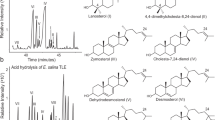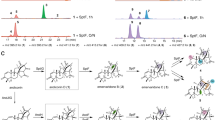Abstract
THE study of steroid synthesis by micro-organisms and certain oxidations and reductions of reactive groups at positions 3 and 17 of the steroid skeleton have been previously reported1. Turfitt2 has studied more extensive degradations of cholesterol by bacteria and has isolated products in which the side-chain has been removed and ring A opened. We should like to report the application of adaptive bacterial enzymes to the study of the oxidative degradation of steroid hormones.
This is a preview of subscription content, access via your institution
Access options
Subscribe to this journal
Receive 51 print issues and online access
$199.00 per year
only $3.90 per issue
Buy this article
- Purchase on Springer Link
- Instant access to full article PDF
Prices may be subject to local taxes which are calculated during checkout
Similar content being viewed by others
References
Ottke, R. C., Tatum, E. L., Zabin, I., and Bloch, K., J. Biol. Chem., 189, 429 (1951). Arnaudi, C., Experientia, 7, 81 (1951).
Turfitt, G. E., Biochem. J., 42, 376 (1948).
McIlwain, H., J. Gen. Microbiol., 2, 288 (1948).
Author information
Authors and Affiliations
Rights and permissions
About this article
Cite this article
TALALAY, P., DOBSON, M. & TAPLEY, D. Oxidative Degradation of Testosterone by Adaptive Enzymes. Nature 170, 620–621 (1952). https://doi.org/10.1038/170620a0
Issue Date:
DOI: https://doi.org/10.1038/170620a0
This article is cited by
-
Biodegradation of polycyclic aromatic hydrocarbons (PAHs) by bacterial mixture
International Journal of Environmental Science and Technology (2022)
-
Characterization of Methyltestosterone Degrading Bacteria Isolated from Tilapia Masculinizing Ponds: Metabolic Intermediate, Glucose Amendments Effects, and Other Hormones Transformation
Water, Air, & Soil Pollution (2020)
-
Degradation of Oestrogen and an Oestrogen-like Compound in Chicken Faeces by Bacteria
Water, Air, & Soil Pollution (2018)
-
Cloning and Characterization of the Gene Encoding Alpha-Pinene Oxide Lyase Enzyme (Prα-POL) from Pseudomonas rhodesiae CIP 107491 and Production of the Recombinant Protein in Escherichia coli
Applied Biochemistry and Biotechnology (2018)
Comments
By submitting a comment you agree to abide by our Terms and Community Guidelines. If you find something abusive or that does not comply with our terms or guidelines please flag it as inappropriate.



